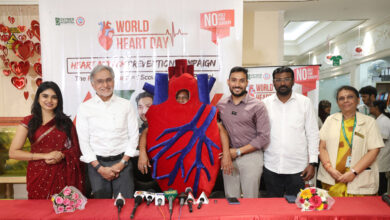Beyond the Pill: The Rise of Health-Tech Collaborations and Digital Awareness Campaigns

Penned By – Jeevan Kasara, Director & CEO, Steris Healthcare
In an era where healthcare is becoming increasingly personalized, accessible, and technology-driven, the industry is moving beyond the traditional confines of “the pill.” The rise of health-tech collaborations and digital awareness campaigns marks a paradigm shift in how wellness, prevention, and treatment are being approached—not just by healthcare providers, but also by pharmaceutical companies, digital health startups, and consumers.
The Evolution of Healthcare
Traditionally, healthcare focused on diagnosing diseases and prescribing medications. Today, the emphasis is shifting to prevention, continuous care, and real-time monitoring. This transition is being propelled by the convergence of health-tech innovations—such as wearable devices, telemedicine, AI-powered diagnostics, and remote monitoring platforms—with large pharmaceutical and healthcare organizations. These collaborations are enabling a more holistic view of patient care that begins long before a prescription is written.
Health-Tech Partnerships Are Transforming Outcomes
Pharma giants are increasingly joining hands with tech startups to co-develop platforms that track medication adherence, provide AI-based health insights, and offer digital therapeutics. For example, partnerships between device manufacturers and health insurance providers allow patients to monitor chronic conditions like diabetes or hypertension in real-time and receive personalized feedback. These alliances ensure that care is proactive, rather than reactive.
Companies like Google Health, Apple Health, and Fitbit have been working with medical researchers and pharmaceutical companies to collect and analyze real-world health data. This helps in identifying patient trends, improving clinical trial designs, and ensuring treatments are better tailored to individual lifestyles and needs.
Digital Awareness Campaigns: Educating the New-Age Consumer
In parallel with tech integrations, digital awareness campaigns have become a vital tool for shaping public perception, driving patient engagement, and fostering informed decision-making. Social media, influencer partnerships, and AI-powered chatbots are being utilized to educate consumers about everything from preventive screenings and vaccination drives to mental health and chronic disease management.
For instance, campaigns focused on menstrual health, early cancer screenings, or lifestyle changes to manage diabetes have seen massive traction on platforms like Instagram, YouTube, and LinkedIn. These efforts aren’t just advertising; they’re creating a culture of awareness and self-care, especially among millennials and Gen Z, who are more likely to research their symptoms online before visiting a clinic.
Empowering the Patient
With increasing digital literacy, patients are no longer passive recipients of care. They are stakeholders—empowered by health apps, teleconsultation services, and access to medical content. From scheduling appointments to understanding lab results, digital tools have simplified patient journeys, minimized hospital visits, and improved treatment adherence.
For example, apps that remind patients to take their medication, track side effects, and connect them directly with healthcare providers are helping reduce hospital readmissions and improve outcomes. This integration of digital touchpoints is especially crucial in underserved or remote areas, where traditional healthcare infrastructure may be lacking.
Challenges and Ethical Considerations
While the rise of health-tech collaborations and digital campaigns is promising, it also brings challenges. Data privacy, misinformation, and unequal access to technology remain pressing concerns. The need for regulatory frameworks to govern health data usage and ensure ethical digital campaigning is urgent.
Moreover, not all demographic groups are equally tech-savvy. Campaigns must be inclusive, culturally sensitive, and accessible across digital literacy levels to avoid widening the health equity gap.
Conclusion: A Future-Ready Ecosystem
The healthcare industry is no longer about just treating illness—it’s about building ecosystems of wellness. By going beyond the pill and embracing tech collaborations and digital advocacy, stakeholders are creating a future where healthcare is predictive, participatory, and personalized.
As these trends continue to mature, the collaboration between technology and healthcare will not only drive better health outcomes but will also reframe our understanding of care—from isolated clinical episodes to a continuous, digitally enabled wellness journey.




